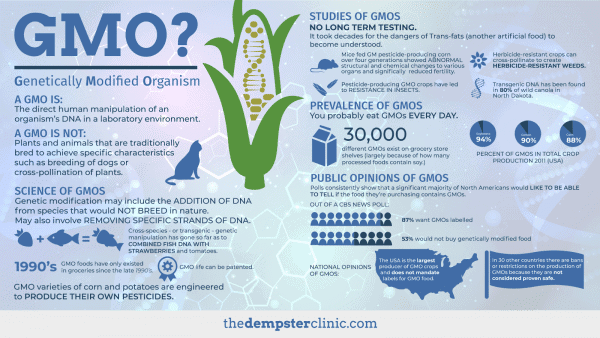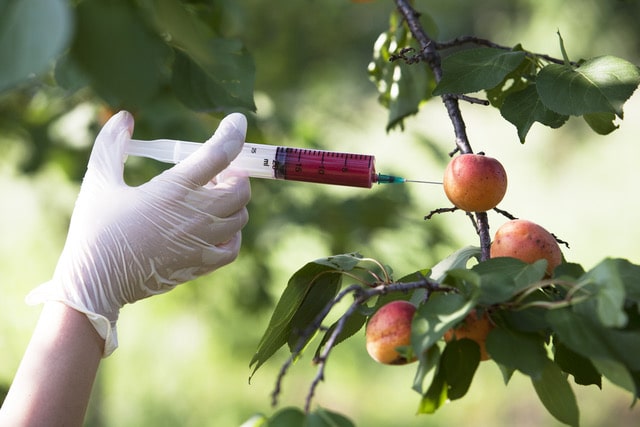Supermarkets just don’t feel as safe as they used to. From hidden ingredients that can trigger food sensitivities to sugars and preservatives that might spark a SIBO outbreak, knowing what to buy for healthy eating isn’t simple.
One threat that’s gaining plenty of attention are GMOs (genetically modified organisms). Depending on who you talk to, these crops are freaky mutants that should never exist or the secret to saving the world from starvation.
What should you believe? The truth is that GMO foods aren’t as harmless as ‘Big Ag’ lobbyists want you to think. There are some sinister side effects to these products, both for your body and the environment. In fact, the evidence shows that GMO foods are shortening your lifespan.
Ready to learn the truth? Let’s look at the facts.

What are GMO Foods?

At a basic level, GMOs are organisms (usually plants or animals) whose genes are modified in a laboratory setting. These “franken-foods” first entered the market in the 1970s, though humans have technically been changing crops to fit their preferences since the beginning of agriculture.
However, unlike the slow natural selection process that helped our ancestors transform wild plants into the produce we enjoy today, GMOs are made by artificially splicing genes from one crop and putting them into another, usually unrelated.
Feeling skeptical that you’ve ever tried a GMO food? Think again. As of 2010, approximately 80 percent of the corn and 90 percent of the soybeans grown in America and Canada came from seeds that were genetically modified. These crops are regularly fed to livestock, and they are foundational ingredients for millions of processed foods on grocery store shelves.
That’s not to say that all kinds of food (or even the majority) are at risk of genetic modification. Most fruits and vegetables are still non-GMO, and the only GMO livestock is a salmon that’s still pending FDA approval.
Considering the amount of wheat and corn-based products most of us eat, it stands to reason you’ve been exposed to genetically modified organisms. Are GMOs safe to eat? That question is more contentious than it should be, as the evidence shows real reasons to be concerned about the products on your plate.
Six Main Dangers of GMO Foods
Should you pay attention to the GMO products in your life? The evidence shows that’s smart. Below are six main dangers of GMO ingredients that you should stay aware of.
1. Potentially Linked to Reproductive Problems
The research is still forthcoming, but early evidence highlights some real dangers for your reproductive health of consuming GMO products. Most studies so far have focused on rodents, but they highlight some disturbing results. For instance, mother rats fed only GM soy had half their babies die within three weeks, and male rats fed the same diet experienced changes in their sperm and testicles that affected their ability to reproduce.
Even the mice that survived had problems. Infant rats raised on GM soy were smaller than average, and they had fewer babies once they matured. Perhaps most worrying, the babies’ DNA functioned differently than their parents, proving that the changes from their diet went more than skin deep.

These effects are starting to be noticed in the field. Reports show that thousands of sheep and goats suffered reproductive problems in India after eating GMO cotton plants, and over two dozen US farmers have stated that GMO corn raised the rates of sterility in their pigs and cows.
2. Can Trigger Allergies
It’s not your imagination; more children these days seem to be developing allergies and food sensitivities. Part of the blame might be GMO foods in their diet.
For instance, research from the UK reveals that rates of soy allergies increased 50% after GM soy became prevalent, and simple skin prick tests show that some people have allergic reactions to GM soy but not natural varieties. The same allergy symptoms have also been seen in GM corn and cotton with livestock and farm workers.
Making the effects even more sinister, there is evidence that eating GMOs can make you allergic to non-GMO foods. These findings are based on rodent studies where mice fed GM soy and peas experienced a reduction in their digestive enzymes, which caused them to have severe reactions to “natural” foods.

Why the increase in allergies? It’s possible that the modification process has introduced an unexpected allergen into soy that our bodies haven’t evolved to handle. If this is the case, there’s no way to predict how your system will respond to the substance over time.
3. Damaging to the Environment

The threats of GMO foods go beyond your body. Modified crops and the herbicides used to control them can harm birds, amphibians, insects, water systems, and soil microorganisms.
Because these seeds are specially engineered to have traits that aren’t already found in nature, environmentalists worry about the effects of these compounds intermingling in the greater ecosystem. For instance, GMO wheat might interbreed with wild strains and introduce unnatural traits into their gene pool that can never be eradicated- to unknown effects.
Likewise, “herbicide-tolerant” crops are designed to survive the toxic compounds that kill competing weeds, which encourages farmers to use more agricultural chemicals. Not only does this poison the soil, but it also puts farm workers and consumers at risk of contamination. There are also concerns that growing herbicide and insecticide-tolerant plant varieties will encourage pests to develop resistance to them, rendering them ineffective in the long run.
4. Puts the Global Food Supply at Risk
A common argument for the use of GMOs is that they are the key to feeding the world’s growing population. Sadly, they seem more likely to put our food supply at risk.
The natural world thrives on biodiversity, while GM plants are all bred to be the same. Usually, if a disease threatens to wipe out a crop, there is a strong chance that a few individuals will have the genes needed to withstand the threat and pass their immunity on to the next generation. In the case of genetic sameness for GMOs, a disease could wipe out every last individual and put the food supply at serious risk.

If you need more proof of the dangers of relying on a single crop variety, look no further than the infamous Irish potato famine.
5. Gives Companies Intellectual Property Rights Over Life

Should it be possible to patent life? GMO researchers certainly think so. A primary purpose of developing new crop varieties is to gain intellectual property rights (a patent) over the types they produce. This might sound insignificant, but it irreversibly changes a fundamental aspect of traditional farming- a farmer’s ability to control the future of their crops by saving seeds. Patented seed varieties mean that farmers must buy them new from the manufacturer (usually Monsanto) each year or face criminal charges.
Even worse, these companies maintain rights over their plant’s DNA, no matter where it winds up. There are legal cases where non-GMO farmers are taken to court for theft because pollen from their neighbour’s fields intermixes with their own crops and changes their DNA. Do you want to fight the practice of putting farmers in jail because of the growing practices of their neighbours? Then consider avoiding GMO foods for good.
6. Triggers Wide-Ranging Health Problems

As genetic engineering works by blending genes from entirely unrelated species, the process can trigger unexpected, unhealthy side effects. Research is only in the beginning stages about these impacts, but some doctors speculate that the rise in stomach problems, autoimmune disorders, and even chronic diseases have a connection with GMOs.
For instance, members of over five villages in the Philippines became sick when the GMO corn they were growing was pollinated, and research on rats fed GM potatoes found that their stomach lining underwent extreme cell growth in ways that can trigger cancer, while also damaging other organs and their immune systems.
Scientists don’t entirely understand the process of creating GM plants and animals, and some assume that meddling with DNA can lead to the production of new carcinogens and other damaging compounds. Part of the problems seems to be that genetically modified foods can leave material within you.
For instance, the genes inserted into GM soy can transfer into your internal bacteria, and toxic compounds from insecticides in GM corn have been found contained in the blood of pregnant women and their fetuses. It’s also possible that genetic modification strips nutrition from some species, potentially leading to nutritional deficiencies for those who eat them instead of regular crops.
How to Identify GMO Ingredients in Your Food
Are you ready to eliminate GMO foods from your diet for good? Unfortunately, that’s easier said than done.
Canada currently doesn’t require food manufacturers to disclose their use of genetically altered ingredients, and almost 98 percent of Canadian-grown canola is GMO, as well as most feed corn, soy, and sugar beets. Store shelves likely contain modified sweet corn, zucchini, papaya and other produce, and GMO alfalfa feeds millions of the country’s horses.
Possibly because of this ability to hide in plain sight, research from Consumer Reports shows that GMO ingredients are common in packaged foods like chips, protein bars, breakfast cereals and more.

The best way to start spending your food dollars elsewhere is to educate yourself about where GMOs are found through resources like the NonGMOShoppingGuide.com.
Make Better Food Choices at The Dempster Clinic- Center for Functional Medicine
Determining which foods are safe to eat is difficult, but I’m here to guide you through the process. At The Dempster Clinic- Center for Functional Medicine, I can work with you to address any concerns (dietary or otherwise) that you may have to improve the functioning of your digestive system.
I am pleased to offer a Complimentary 15-minute Discovery Session for all potential patients. This session can take place over the phone or at the clinic in person. It provides an opportunity for you to learn more about the services I offer and how they can be of benefit to you.
Please schedule an appointment today! Your best health awaits.
Dr. John Dempster, ND
The Dempster Clinic- Center for Functional Medicine


